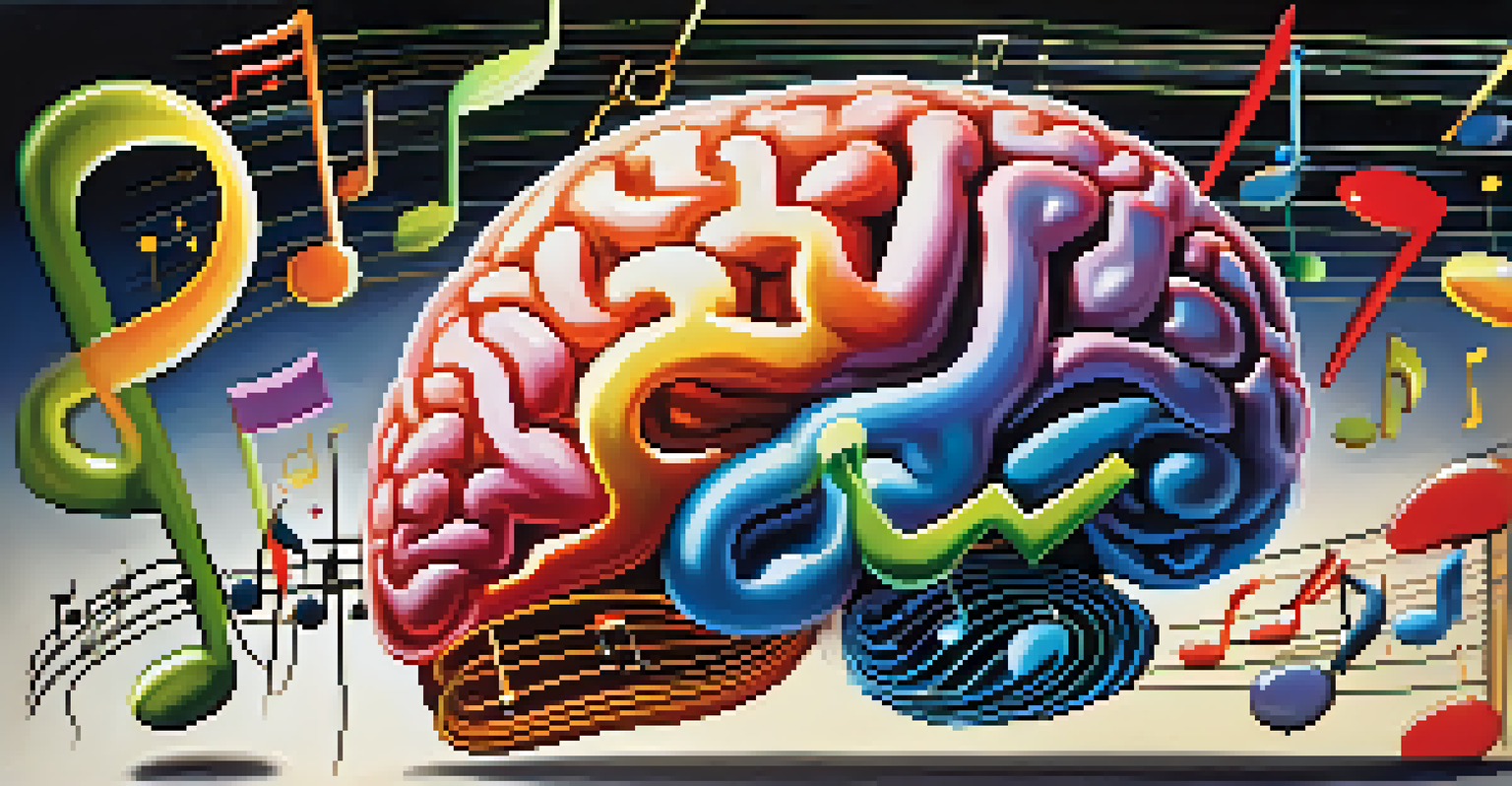The Biological Basis of Music and Time Perception

Understanding the Connection Between Music and Biology
Music is not just an art form; it's deeply rooted in our biology. From the moment we hear a melody, our brain reacts in fascinating ways, engaging various regions responsible for emotion, memory, and even movement. This biological connection explains why music often evokes strong feelings and memories, as it activates the same neural pathways linked to these experiences.
Music can change the world because it can change people.
Research shows that listening to music can trigger the release of dopamine, the 'feel-good' neurotransmitter. This reaction highlights the profound impact music has on our mood and overall well-being, suggesting that our biological makeup is finely tuned to appreciate and respond to musical stimuli. Furthermore, studies indicate that even infants respond positively to music, indicating that this connection may be innate.
Thus, understanding the biological basis of music opens up a world of possibilities for enhancing mental health and emotional well-being. As we explore how music interacts with our biology, we begin to appreciate its role not just as entertainment, but as a vital component of human experience.
The Role of Rhythm in Music and Time Perception
Rhythm is a fundamental aspect of music that influences our perception of time. When we listen to a song, the beats and tempo create a framework that our brains use to process the passage of time. This interplay between rhythm and time perception is so significant that it can even alter our experience of duration, making time seem to fly or drag depending on the tempo of the music.

Research suggests that our brains are wired to detect rhythmic patterns, which helps us anticipate when the next beat will occur. This predictive capability enhances our engagement with music and can even improve our timing in activities like dance or sports. The synchronization of our internal clock with external rhythms plays a crucial role in our ability to enjoy and participate in musical experiences.
Music's Impact on Emotion and Memory
Music activates brain regions linked to emotion and memory, evoking strong feelings and vivid recollections.
Moreover, the impact of rhythm extends beyond music; it influences our daily lives as well. From the way we perceive time during a fun event to how we manage our schedules, understanding this connection can help us navigate our routines with more awareness and enjoyment.
Neuroscience: The Brain's Response to Music
Neuroscience has provided remarkable insights into how our brains respond to music. Brain imaging studies reveal that listening to music activates multiple areas of the brain, including those associated with emotion, motor control, and even visual processing. This widespread activation underscores music's ability to engage us holistically, making it a powerful tool for communication and expression.
Without music, life would be a mistake.
Additionally, the left hemisphere of the brain is often associated with analytical tasks, while the right hemisphere is linked to creativity and emotional processing. Interestingly, music engages both sides, allowing for a unique blend of analysis and emotion. This dual engagement can explain why music is often used in therapy, helping individuals connect with their feelings and experiences on a deeper level.
Understanding these neural responses can enhance our appreciation of music's impact on our lives. By recognizing the brain's complex interaction with music, we can explore new ways to harness this power for learning, healing, and personal growth.
Cultural Influences on Music and Time Perception
Culture plays a significant role in shaping our musical experiences and time perception. Different cultures have unique musical traditions, rhythms, and even concepts of time, which can influence how individuals perceive music. For instance, some cultures emphasize syncopation, while others may focus on strict tempos, leading to diverse musical expressions.
These cultural variations can affect not just the music we enjoy but also how we interpret time. In some cultures, time is seen as fluid and flexible, while in others, it is linear and structured. This cultural lens can alter our experience of music, making it essential to approach musicality with an understanding of its broader social context.
Rhythm Shapes Time Perception
The rhythm in music influences how we perceive time, making it feel faster or slower depending on the tempo.
By appreciating the cultural dimensions of music and time, we can enhance our connections with others and deepen our understanding of diverse musical traditions. This awareness fosters a richer appreciation for the global tapestry of music and its ability to bridge cultural divides.
The Evolutionary Perspective on Music and Time
From an evolutionary standpoint, music may have developed as a tool for social bonding and communication. Early humans likely used rhythmic sounds and melodies to strengthen group cohesion, enhance cooperation, and facilitate emotional expression. This suggests that our affinity for music isn't just a modern phenomenon but rather a deeply ingrained part of our evolutionary heritage.
Furthermore, time perception may have evolved in tandem with music, assisting early humans in coordinating activities like hunting and gathering. Synchronizing movements to rhythmic sounds could have improved group efficiency, highlighting the interconnectedness of music and our survival strategies. This evolutionary perspective offers valuable insights into why music remains such a vital aspect of human life.
By exploring music through the lens of evolution, we can better appreciate its role in shaping social dynamics and human behavior. Understanding these roots can inspire us to incorporate music into our everyday lives and recognize its continued importance in fostering connection and community.
Music, Emotion, and Memory: A Biological Connection
The link between music, emotion, and memory is a fascinating area of study in the biological basis of music. When we hear a song that resonates with us, it can evoke vivid memories and strong emotions, often transporting us back to specific moments in time. This phenomenon occurs because music activates areas of the brain linked to both memory and emotion, weaving a rich tapestry of experiences.
For instance, the hippocampus, crucial for memory formation, is highly active when we listen to familiar tunes. This activation can explain why certain songs trigger nostalgia or remind us of significant life events. Whether it's a song from our youth or a tune associated with a particular moment, music has the power to evoke memories that might otherwise fade over time.
Cultural Influences on Music Experience
Different cultures shape our musical experiences and concepts of time, affecting how we interpret and enjoy music.
Understanding this connection allows us to harness the power of music in various settings, from therapeutic environments to personal reflection. By using music intentionally, we can create emotional connections and facilitate healing experiences, demonstrating the profound impact of music on our emotional landscape.
Practical Applications of Music and Time Perception in Life
The insights gained from studying the biological basis of music and time perception have practical applications in our daily lives. For instance, incorporating music into our routines can enhance productivity, improve mood, and even aid in relaxation. By choosing specific genres or tempos, we can create an environment that fosters concentration or encourages leisure.
Additionally, understanding how rhythm influences our perception of time can help us manage our schedules more effectively. By utilizing music with a steady beat during tasks, we can create a sense of flow that makes time seem to pass more pleasantly. This approach can be particularly beneficial in high-stress situations, where music serves as a calming presence.

Ultimately, recognizing the biological connections between music, emotion, and time can empower us to make more intentional choices in our lives. By embracing the power of music, we can enhance our well-being, improve our relationships, and cultivate a greater appreciation for the rhythms that shape our experiences.